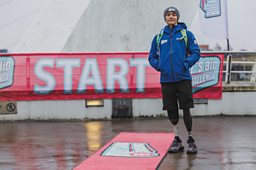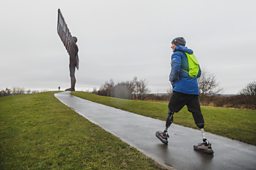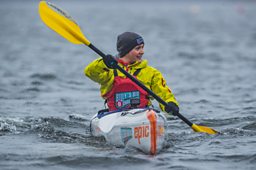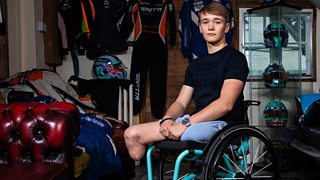Battered, but not broken β young racing driver Billy Monger's new endurance test
Four years ago in April, racing driver Billy Monger (known as "Billy Whizz") had a horrific car crash during a Formula 4 race at Donington Park. The crash left Billy, just 17-years-old at the time, with life-changing injuries. He had to be put into an induced coma and had both legs amputated.
In the years since, supported by his family, the motorsport industry and the public at large, Billy has literally put himself back on track, taking part in the British F3 Championship less than a year later.
This astonishing turnaround owes so much to Billy’s positivity. In Don’t Tell Me The Score, Billy talks to Simon Mundie about how he achieved this state of mind in the face of difficult challenges, and why he will now push himself to new feats of endurance.

In Don't Tell Me The Score, Billy Monger tells Simon Mundie about the lessons he's learned from and since his crash, including around gratitude and acceptance. To accept ourselves means to value our supposed imperfections as much as anything else.
Billy recently agreed to walk, cycle and kayak 140 miles in four days for . You can watch on Thursday 18 March at 9pm, on ΄σΟσ΄«Γ½ One.
Looking back at the crash actually helped
As part of getting his life back on track, Billy revisited the shocking footage of his crash. This might well seem counter-intuitive, almost dangerous, given the PTSD that can occur after traumatic incidents. “If I look back at my time spent in hospital, the best thing I did was watch that accident over and over again,” he says.
Because the crash happened so quickly, Billy didn’t feel he had a grasp of what had happened and he wondered if there was anything else he could have done. “Once I watched it, I realised that it was just the wrong place at the wrong time. There was nothing that was in my control that would change the outcome. I felt a huge weight off my shoulders.”

There are no guarantees in life
It’s hardly surprising that Billy’s view of the world was changed after the crash, especially with the perspective he gained from watching it back. “What I've learned in life is you're not guaranteed anything,” Billy says. “You're not guaranteed even your next day, which is what could have been the case with me.”
“I try to live my life by setting my sights on something that's achievable and doable in a short period of time and by living that target every day. Looking too far ahead can sometimes scare you.”
Billy accepts where his life is now
Acknowledging that life has no guarantees is one thing, but the journey to a full acceptance was a little longer.
“As part of recovery from my accident, I had to accept my situation,” says Billy. “That was the reality of it, and that's how I got over it. It would have been so damaging to just sit there and think, ‘Why me? Why this? Why that?’ Once I fully accepted where I was in life, that allowed me to then accept a better future for myself and in my head go: ‘this is where you're at now, and accept that – with some hard work, with some determination – you can be anywhere you want to be.’”

βYouβve got to love yourself.β
Billy’s success in cultivating a positive philosophical attitude has not come without challenges along the way, but he has found a way around them. “There's definitely been times in over the last few years where the fact that I'm missing limbs and the fact that I'm different has scared me and made me feel uncomfortable,” he says. “I've been in situations where people are judging you, but I think that was at a time where I just felt a little bit uncomfortable in my own skin.”
Missing limbs and the fact that I'm different has scared me.
“I realise nowadays that the most powerful mentality I can ever give to myself is just fully accepting who I am, and you’ve got to love yourself, really, and put out that energy to other people. Whether they accept that or not shouldn't have any influence on how you how you feel about yourself.”
Billy’s new relationship with social media
In the course of Billy understanding more about what drives people, he found that he had a bit more time for trolls on social media: “I think I've got a bit of sympathy and a bit more empathy for people now that have that sort of mentality where they instantly pass judgement. It's mainly insecurities about how maybe they perceive themselves.”
One aspect of social media that Billy is more wary of is the "stay in your lane" view of some users, which goes against his desire to take up new opportunities.
“I think in today's society everyone finds a little bit trickier to try new things because there's always someone on social media instantly trying to put it down or tell you that you should stick to what you know. But one of the things that accident has told me is that I want to go out there and try in so many different areas. I don't want to just be the guy that has one interest and doesn't look outside of that for the rest of my life.”

Taking up the Comic Relief triathlon challenge
Not only does Billy want the experience of trying new things, he relishes the challenge too – to the point that he likes “not being good at stuff because it makes me want to try a bit harder.”
Couple this to Billy’s desire to get back to training and it’s easier to see why he said yes to his Comic Relief challenge even though the scale of it – covering 140 miles over four days by walking, cycling and kayaking – “seemed crazy at the time.”
“I think if they come to me any other point of the year, I probably would have said no, but my mindset was in the right spot. I was feeling good about the way I was progressing with my fitness and my training.” Billy did, nonetheless, find the training regime brutal, which is hardly surprising as he completed a regime in three months that most able-bodied athletes do in nine!
However, getting a close look at the charities his challenge would be benefit really helped Billy focus. “On days where you want to find that bit of motivation and to push yourself a bit further, it's nice when you're doing it for charity and to have seen the people first-hand that you're going to affect.”


Keeping up with Billy on the ΄σΟσ΄«Γ½
-
![]()
I lost my legs but not my daredevil spirit
A ΄σΟσ΄«Γ½ News long read special on Billy's accident, recuperation and rehabilitation.
-
![]()
Driven: The Billy Monger Story
Following Billy Monger as he attempts to become the first ever double amputee to race competitively.
-
![]()
Find details of Billy's gruelling triathlon-inspired challenge.
-
![]()
Don't Tell Me The Score
Each week Simon Mundie sits down with an expert and uses sport to answer lifeβs big questions.




